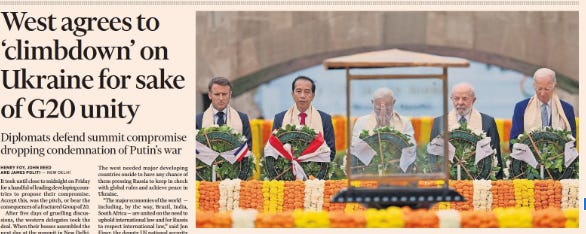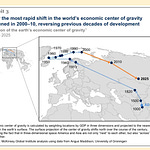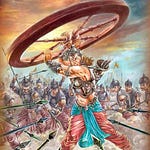A version of this essay was published by firstpost.com at https://www.firstpost.com/opinion/shadow-warrior-g20-and-its-fallout-india-the-swing-state-imec-and-trudeaus-tantrums-13162212.html?utm_source=twitter&utm_medium=social
A fortnight after the end of the G20 Summit in New Delhi, it’s worth revisiting what really materialized, and what India can expect out of all the hard work that went into it.
First, the positives. The flawless execution of the Summit is something the Indian leadership and officials deserve to be congratulated on. There were all sorts of things that could have gone wrong – including security worries – but the whole thing was done with clockwork precision. In a way, this is unsurprising: Indians revel in complexity, and surely running this event, despite the VVIP foreigners, was easier than pulling off the Kumbha Mela.
Many pundits had written off the Summit, citing the absence of Xi Jinping and Vladimir Putin, and predicting that it would be next to impossible for there to be a consensus based on which a common declaration could be accepted by all. In the event, the 83-paragraph Leaders’ Declaration, wide-ranging and comprehensive, was seen as a diplomatic triumph, with everybody giving in a little on their positions in the interest of the G20 community.
The fact that NATO members had to swallow a watered-down condemnation of the Ukraine war, without actually naming Russia, has been framed as a ‘climbdown by the West for the sake of G20 unity’ by the Financial Times. That’s pretty good spin, but it was remarkable that they didn’t seem to be bothered by such ‘G20 unity’ at the Bali Summit, 2022.
There are more plausible reasons for this ‘climbdown’. One is that the Ukraine war is not going according to plan, which anticipated Russia being beaten by now, both militarily and financially. On the contrary, the EU continues to be Russia’s biggest customer, by far. So the sanctions have failed, and the EU is probably fed up with energy shortages. Plus, the Ukrainians don’t seem to be making much progress with the much-hyped ‘counteroffensive’. NATO could well be on the point of throwing Zelenskyy under the bus any day now.
The West appears to be backpedaling furiously, and they have made such miscalculations before: 1971, Bangladesh; 1975, Vietnam, and so on. Ironically, POTUS Biden went to Vietnam after the G20 Summit, and announced billions of dollars worth of deals in semiconductors and AI, among other things. What a U-turn from the 1970s! Kissinger would be turning over in his grave, except he’s still alive.
A more optimistic reading of the G20 outcome could well be that India has finally become a swing state. While it is precarious being a swing state, it also has benefits: you get courted by both sides, and you can play them off against each other. India’s persistent and aggressive fence-sitting, combined with its robust economic performance, is now making others pay a little more attention to India’s needs. But it also invites hostility.
There was evidence of this new reality, in a back-handed sort of way, in Canadian PM Justin Trudeau’s hissy-fit against India accusing it of a hit-job on a Khalistani terrorist. Trudeau has his own reasons (hurt amour-propre, perhaps), but the Washington Post reported that nobody else in the Anglosphere agreed to support him, with Biden going to great lengths “to avoid antagonizing India and court the Asian power as a strategic counterweight to China”. Even the usually hostile BBC said, “On the grand geopolitical chess board, India is now a key player”. Deep State is not amused. Nor are the rest of the Five Eyes.
India’s transition from ‘non-aligned’ to ‘multi-aligned’ has come at the right time. I do hope India does not get swayed by its own rhetoric of being the ‘champion of the Global South’ and go back to the Nehru-era ‘king of the banana republics’ self-image. Pretending to be the leader of the Third World, and all the NAM exertions got India nothing at all. In 1961, the entire Third World voted 90-1 against India’s decolonization of Goa, which was startling.
However, things are a little different now that India is looking out for its own interests first and foremost. In that context, the formal induction of the African Union into the G20 is a win for India, especially in light of the stacking of BRICS+ with friends of China.
Looking at it from India’s point of view, the African Union means especially East Africa, which is part of the Indian Ocean Rim, India’s backyard. Africa will be the fastest-growing area, in population and GDP, over the next few decades, and the giant continent’s people face problems quite similar to those Indians face. East Africa has millennia-old trade links with India. For instance, a 1500 year old Malabar-built uru, a wooden ship made of teak, was found buried, well preserved in the sands near Alexandria, Egypt, indicating ancient commerce.
It is in the context that the new Spice Route, or the India-Middle East-Europe Economic Corridor (IMEC), is also a good initiative. For one, it is fairly direct competition to China’s Belt and Road Initiative (BRI), which has been dogged by accusations that it is ‘debt-trap diplomacy’ that ends up with valuable assets extorted from others, as in Hambantota port in Sri Lanka, now forced into a 99-year lease agreement as the debt payments became onerous.
Having said that, and despite the fact that a growing India will have more trade with Europe as in the millennia past, it is not entirely clear that the IMEC will take off. On the one hand, there is the history of prized Indian goods like spices, gold, gems, etc. The Roman Pliny the Younger complained that their treasury was being emptied because of the demand for spices and in satisfying “the vanity of [our] women” with cosmetics etc. from India.
India of the future may not become, or may not be allowed to become, a workshop of the world at the scale of China. After all, China will not go off into that good night without raging, raging. An article by Martin Wolf in the Financial Times pointed out that ‘peak China’ may be some time off. I usually disagree with the man, but here I agree: China’s obituaries are a bit premature. It will also double down on a new and improved BRI.
Going back to IMEC, there are also practical difficulties even if the political will and funding can be arranged: the port of Haifa, Israel, which would be a logical choice for it, has a major terminal where China is the concessionaire, and so does the Greek Port of Piraeus. Interestingly enough, Adani Ports has control over the older terminal at Haifa, and is reported to be seeking a terminal at Piraeus as well. How curious that Soros keeps attacking Adani again and again: perhaps he is acting on China’s behalf as well?
Chances are that IMEC will remain a pipe-dream, but there is more of a chance that the Digital Public Infrastructure (DPI) that India has excelled in may be appealing to many other nations. According to the World Bank, India only took 6 years to achieve development that would normally take 47 years, because of the efficiency improvements due to digitization. This is something the Global South can use.
There is also a negative from the G20. The upsurge in infiltration and the huge standoff against terrorists in Anantnag, Jammu and Kashmir, may well be a Chinese signal that they can ratchet up mischief any time, and that the G20 success should not go to India’s head. Given that there is a lot of alleged infiltration into and coziness by the Chinese into the Canadian establishment, Trudeau’s tantrums may also be inspired by China: the other shoe dropping.
All in all, India gets a solid A- for its G20 efforts; the outcomes, alas, may only be a B-.
1300 words, 20 Sept 2023















Share this post